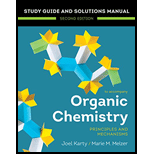
Interpretation:
Among the given reactions, the reactions that proceed with carbocation rearrangement are to be identified.
Concept introduction:
The
The
The leaving bonded to tertiary carbon proceeds with
Want to see the full answer?
Check out a sample textbook solution
Chapter 9 Solutions
Organic Chemistry: Principles And Mechanisms: Study Guide/solutions Manual (second)
- 1) Draw the control charts for the following data and interpret the result and also develop control limts for future use. 24 samples are taken each with a subgroup size of 3. Problem to be solved both as an assignment and laboratory. Subgroup X₁ X2 X3 1 7 8 10 2 9 9 14 3 15 16 10 4 14 13 15 5 12 11 10 6 10 11 9 I 7 10 9 9 8 15 17 13 9 10 7 8 10 9 8 9 11 8 8 10 12 17 13 10 13 10 12 11 14 9 9 10 15 10 8 8 16 11 10 9 17 10 10 8 18 8 9 7 19 9 8 9 22222 10 10 11 9 10 9 11 9 10 12 12 11 14 2012 4arrow_forwardHow much of each solution should be used to prepare 1L of a buffer solution with a pH of 9.45 using 3M Na2CO3 and 0.2M HCI? Given: Ka 1 = 4.3 × 10-7, Ka2 = 4.69 × 10-11arrow_forwardAdd substituents to draw the conformer below (sighting down the indicated bond), then rotate the back carbon to provide the anti staggered conformer. + H3C H Ph H Problem 25 of 30 Drawing Atoms, Bonds and Rings Charges Tap a node to see suggestions H H H Undo Rasat Remove Done Finish update Rotate Submitarrow_forward
- what temperature does a 50% (mole fraction) of ammonia/water liquid mixture boil at 1 atmarrow_forward1) Suppose 0.1 kg ice at 0°C (273K) is in 0.5kg water at 20°C (293K). What is the change in entropy of the ice as it melts at 0°? To produce the original "water gas" mixture, carbon (in a combustible form known as coke) is reacted with steam: 131.4 kJ + H20(g) + C(s) → CO(g) + H2(g) From this information and the equations in the previous problem, calculate the enthalpy for the combustion or carbon to form carbon dioxide. kindly show me how to solve both parts of the same long problem. Thanksarrow_forwardwe were assigned to dilute 900ppm in to 18ppm by using only 250ml vol flask. firstly we did calc and convert 900ppm to 0.9 ppm to dilute in 1 liter. to begin the experiment we took 0,225g of kmno4 and dissolved in to 250 vol flask. then further we took 10 ml sample sol and dissolved in to 100 ml vol flask and put it in to a spectrometer and got value of 0.145A . upon further calc we got v2 as 50ml . need to find DF, % error (expval and accptVal), molarity, molality. please write the whole report. thank you The format, tables, introduction, procedure and observation, result, calculations, discussion and conclusionarrow_forward
- Q5. Predict the organic product(s) for the following transformations. If no reaction will take place (or the reaction is not synthetically useful), write "N.R.". Determine what type of transition state is present for each reaction (think Hammond Postulate). I Br₂ CH3 F2, light CH3 Heat CH3 F₂ Heat Br2, light 12, light CH3 Cl2, light Noarrow_forwardNonearrow_forwardIn the phase diagram of steel (two components Fe and C), region A is the gamma austenite solid and region B contains the gamma solid and liquid. Indicate the degrees of freedom that the fields A and B have,arrow_forward
- For a condensed binary system in equilibrium at constant pressure, indicate the maximum number of phases that can exist.arrow_forwardPart V. Label ad match the carbons in compounds Jane and Diane w/ the corresponding peak no. in the Spectra (Note: use the given peak no. To label the carbons, other peak no are intentionally omitted) 7 4 2 -0.13 -0.12 -0.11 -0.10 -0.08 8 CI Jane 1 -0.09 5 210 200 190 180 170 160 150 140 130 120 110 100 -8 90 f1 (ppm) 11 8 172.4 172.0 f1 (ppr HO CI NH Diane 7 3 11 80 80 -80 -R 70 60 60 2 5 -8 50 40 8. 170 160 150 140 130 120 110 100 90 -0 80 70 20 f1 (ppm) 15 30 -20 20 -60 60 -0.07 -0.06 -0.05 -0.04 -0.03 -0.02 -0.01 -0.00 -0.01 10 -0.17 16 15 56 16 -0.16 -0.15 -0.14 -0.13 -0.12 -0.11 -0.10 -0.09 -0.08 -0.07 -0.06 -0.05 -0.04 17.8 17.6 17.4 17.2 17.0 f1 (ppm) -0.03 -0.02 550 106 40 30 20 20 -0.01 -0.00 F-0.01 10 0arrow_forwardConsider the reaction of 2-methylpropane with a halogen. With which halogen will the product be almost exclusively 2-halo-2-methylpropane? 1. F2 2. Cl2 3. Br2 4. I2arrow_forward
 Organic Chemistry: A Guided InquiryChemistryISBN:9780618974122Author:Andrei StraumanisPublisher:Cengage Learning
Organic Chemistry: A Guided InquiryChemistryISBN:9780618974122Author:Andrei StraumanisPublisher:Cengage Learning
